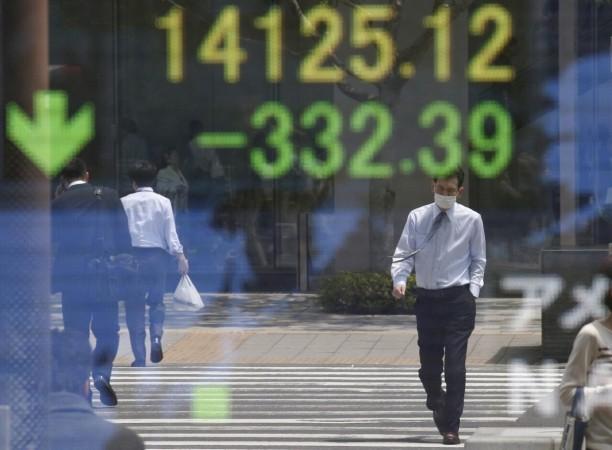
Asian shares caught Wall Street's gloom on Wednesday, while the dollar was on track for a sixth losing session against the yen after the Bank of Japan upgraded its view on capital expenditures.
The BOJ held policy steady as expected at the conclusion of a two-day meeting and maintained its overall upbeat economic assessment.
MSCI's broadest index of Asia-Pacific shares outside Japan slipped 0.1 percent, after U.S. stocks fell in a broad selloff.
Asian investors also kept a wary eye on the situation in Thailand, where the army declared martial law on Tuesday after months of civil and political unrest.
Japan's Nikkei stock average skidded 0.6 percent, as investors awaited post-meeting comments by Bank of Japan Governor Haruhiko Kuroda from 3:30 p.m. (0630 GMT), after the Tokyo market close.
"The market is already jittery about falling U.S. bond yields leading to a weak dollar-yen. Kuroda's comment dismissing the possibility of further easing again won't do any good to the mood," said Hiromichi Tamura, chief strategist at Nomura Securities.
Japanese trade data for April released shortly before the market opened showed that the country posted a record 22nd month of trade deficits. While last month's rise in exports beat forecasts, shipments to the key U.S. market slowed.
The dollar lost about 0.1 percent against the yen to 101.24 yen, not far from Monday's low of 101.10 yen, which was its weakest level since early February.
The recent downtrend in U.S. Treasury yields continued to undermine the dollar's appeal.
The yield on benchmark U.S. 10-year notes inched up to 2.51 percent in Asia from its U.S. close of 2.50 percent on Tuesday, but remained close to half-year lows.
Later on Wednesday, the U.S. Federal Reserve will release the minutes of its latest policy meeting, though most market participants did not expect any solid clues to emerge on the timing of a future hike to interest rates.
New York Federal Reserve President William Dudley said at an event on Tuesday that the U.S. central bank will likely be "relatively slow" in hiking interest rates.
The euro was flat on the day at $1.3702, not far from a nadir of $1.3648 touched on Thursday, which was its lowest since late February.
In commodities trading, U.S. crude rose 0.6 percent to $102.90 per barrel, supported by a disruption in Libya's oil output and an unexpected draw in U.S. crude oil inventory according to industry data.
Spot gold was up about 0.1 percent on the day at $1,295.50 an ounce.





!['Kaise ho bhai..': PM Modi shook hands with Akshay Kumar at a media summit in Delhi [Watch]](https://data1.ibtimes.co.in/en/full/806317/kaise-ho-bhai-pm-modi-shook-hands-akshay-kumar-media-summit-delhi-watch.jpg?w=220&h=138)



